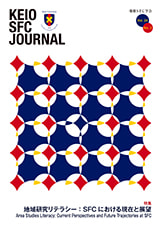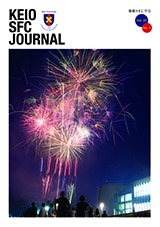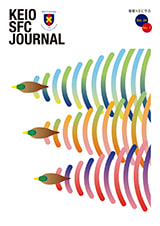- HOME
- KEIO SFC JOURNAL
- Vol.24 No.2

KEIO SFC JOURNAL Vol.24 No.2 Area Studies Literacy: Current Perspectives and Future Trajectories at SFC
published on 2025.03
Area Studies Literacy: Current Perspectives and Future Trajectories at SFC
-
Foreword
Download this article (PDF):SFCJ24-2-00.pdfTomoki Kamo (Professor, Faculty of Policy Management, Keio University)
-
Practicing Area Studies -The Special Research Project in Indonesia
Yo Nonaka (Associate Professor, Faculty of Policy Management, Keio University) The special research project that the author conducts in Indonesia is positioned as a form of education at SFC to teach the essentials of area studies, and the results of the project was verified through analysis of the participating students’ comments at meetings and the products of the project conducted last year. The project has a certain effect as a subject to teach students the essence of area studies, and it also has a significant learning effect when implemented as a part of continuous learning in conjunction with language education, seminar research,and related lecture courses at SFC.
Download this article (PDF):SFCJ24-2-01.pdf -
Middle East Studies and Arabic Language Teaching in Japan -The Potential of SFC Arabic Teaching Focusing on Culture and Communication
Kaoru Yamamoto (Associate Professor, Faculty of Policy Management, Keio University) Reflecting on Islamic studies that supported colonialism during WWII, Japan has developed Middle East studies that are closely connected to local societies since the end of the war, and demand for Arabic has increased accordingly, but there are still many challenges in Arabic teaching, which focuses on grammar and reading. On the other hand, SFC is committed to Arabic language teaching that emphasizes culture and communication, and through project-based classes aims to foster an interest in and deep understanding of the region and to promote exchanges that can contribute to solving problems.
Download this article (PDF):SFCJ24-2-02.pdf -
Between Area Studies and Applied Linguistics -Boundary-Crossings of and from Spanish Language
Mamoru Fujita (Assistant Professor, Faculty of Environment and Information Studies, Keio University) This article starts from the recognition that area studies and language teaching have always had a fragmented and precarious relationship, and explores the possibility of a more fruitful engagement between area studies of the Hispanic world and Spanish language teaching, where various emerging research areas in Spanish applied linguistics and sociolinguistics are important also in terms of area studies of the Hispanic world. This synergy brings new challenges and perspectives to Spanish language teaching. To this end, we will focus on five areas of research: Spanish as pluricentral language, decolonisation and representation, inclusive language, heritage language education in immigrant societies, and new speakers of regional and indigenous languages, and examine how the latest research trends bring about new interconnections between area studies and language education.
Download this article (PDF):SFCJ24-2-03.pdf -
Learning and Using Korean, Then Viewing the World through the Lens of It -An Example of Educational Practice at Keio SFC Korean Section
Takeya Takagi (Assistant Professor, Faculty of Policy Management, Keio University) Isao Yanagimachi (Professor, Faculty of Policy Management, Keio University) Minjung Seo (Visiting Lecturer, Faculty of Policy Management, Keio University) This paper reports on the education practiced by the SFC Korean Section in terms of overseas language programs, special research projects, lecture sessions, development of electronic learning materials and academic activities. Through a series of case reports, the article attempts to show that the activity of language learning itself goes beyond the stage of language acquisition. Rather, it is a place of total learning of building relationships, gathering information and gaining access to the front line, the reality.
Download this article (PDF):SFCJ24-2-04.pdf -
Acquisition of Foreign Languages from the Perspective of Area Studies -In a Case of German as a Foreign Language Instruction at SFC
Ikumi Waragai (Professor, Faculty of Policy Management, Keio University)
This paper reexamines the instruction of German as a foreign language at SFC through its connections to area studies. Using examples from introductory and skillsbased courses, as well as overseas training and fieldwork, it outlines where language acquisition intersects with research on developing and implementing teaching materials. The discussion highlights the significance of learning a language distinct from one’s native tongue, emphasizing how this process fosters a plurilingual and pluricultural perspective while encouraging a nuanced relativization of the learner’s problem awareness.
Download this article (PDF):SFCJ24-2-05.pdf -
Heritage and Updates -Practices and Initiatives at Keio SFC French Section
Hasumi Nishikawa (Assistant Professor, Faculty of Policy Management, Keio University) The French Section at Keio SFC designs and offers courses in French as a foreign language, based on SFC’s philosophy of advancing language education. The core educational goal of the French Section is to recognize the richness in the diverse variants of French Language that are spoken around the world. This paper will provide an overview of how the current French courses endorse SFC’s vision for language education while recognizing changes in the ways societies evolve. New attempts and practices will also be reported as individual cases. The presentation concludes with a few words on the future of foreign language learning and the importance of incorporating plurilingualism and pluriculturalism.
Download this article (PDF):SFCJ24-2-06.pdf -
Bridging Academic Research and Policy-Making -From the Perspective of Contemporary Chinese Political Studies
Tomoki Kamo (Professor, Faculty of Policy Management, Keio University) This paper examines the bridging role of area studies in connecting academic research and policy-making, using the study of authoritarian politics in China as a case. Over the past 30 years, the international order, once characterized by the ‘rise of democracy and the decline of authoritarianism,’ has shifted to a new paradigm: ‘the rise of authoritarianism and the decline of democracy.’ A key policy challenge Japan now faces in international politics is how to engage with a rising authoritarian China. Area studies serve as an intellectual foundation for overcoming stereotypes about authoritarian politics, facilitating the development of diverse policy options, and promoting flexible policy strategies toward China.
Download this article (PDF):SFCJ24-2-07.pdf -
The Significance and Challenges of Area Studies in Bridging International Politics and Reality -Perspectives from Post-Soviet Regional Studies
Yoko Hirose (Professor, Faculty of Policy Management, Keio University)
This paper examines the significance of Area Studies in bridging international political theory with real-world situations, using the Former USSR as a case study. The relationship between Area Studies and international political theory is particularly evident in fields such as conflict studies. Recent events, such as Russia’s invasion of Ukraine, have highlighted the critical challenges and limitations inherent in this academic field. However, Area Studies itself faces numerous obstacles. This study aims to underscore the importance of Area Studies and identify its challenges, offering insights into how regionally informed research can contribute to the formulation of effective international policies.
Download this article (PDF):SFCJ24-2-08.pdf -
Area Studies as “Jissenchi (Practical Knowledge)” -The Case of Energy Access Improvement in Tajikistan
Fumiaki Inagaki (Professor, Graduate School of International Resource Sciences, Akita University) This paper discusses the literacy required for area studies based on the author’s experience in problemsolving research or Jissenchi, such as the JST/JICA SATREPS Project. The objective of area studies is to understand the target area comprehensively. However, as it is an interdisciplinary study, area studies does not have a specific discipline and involves the combination of diverse methods in a “bricolage.” The ability to perform this bricolage is a necessary literacy. Still, it is also necessary to involve knowledge not only from the humanities and social sciences but also from the natural sciences and engineering, and the ability to share the issues and gain the support of these specialists is also a necessary literacy.
Download this article (PDF):SFCJ24-2-09.pdf -
Notes on Area Studies -from “Privileged” and “Expert” Positions
Vu Le Thao Chi (Assistant Professor, Faculty of Policy Management, Keio University) This is an inquiry into the two types of views on the area of research that I found in my research on poverty-stricken families or people with disabilities and their families in Vietnam and East Asia. One is what Maynes and others call a “privileged” position of seeing, hearing, sensing, and living with what that area offers. The other is an “expert” position informed of scientific and professional knowledge about the area. Neither of these positions alone could make an area study stimulating and fruitful.
Download this article (PDF):SFCJ24-2-10.pdf -
Laïcité in Transformation -A Deviation or Manifestation of Republicanism?
Yasutake Miyashiro (Associate Professor, Faculty of Policy Management, Keio University) In recent years, France has seen a transformation in how laïcité (laicity)—one of the fundamental ideas of the republic—is understood. This paper examines the relation between this transformation and French republicanism, focusing on how republic and laïcité, and laïcité and nation, are interconnected to each other. The first section analyzes the argument which regards laïcité as the “French exception” (1). Next, the republican conception of laïcité is clarified (2). The final section reveals how the republican conception raises the question of nationhood (3).
Download this article (PDF):SFCJ24-2-11.pdf -
The “Americanization” of Political Campaigns in East Asia -Campaign Ads in the U.S. and Taiwan
Masahito Watanabe (Associate Professor, Faculty of Policy Management, Keio University) In the U.S., “media-centered elections” based around TV advertising emerged from the 1950s onwards. In addition, since the 1990s, the development of cable TV has enhanced the agenda-setting function of ideological political debates. However, research on the international spread of this “Americanization” of political campaigns has not actually progressed in the case of Asia. This paper examines Taiwan’s election media strategies, particularly TV commercials (advertising videos) and their development in the Internet age comparatively, and shows an example of the penetration and limitations of “Americanization” in East Asian democracies.
Download this article (PDF):SFCJ24-2-12.pdf -
Outer Space as an “Area” -Congestion, Warfighting Domain, and Cislunar Space
Yasuhito Fukushima (Senior Research Fellow, National Institute for Defense Studies) In anticipation of a future where space becomes the focus of interest as an area studies subject, this paper analyzes and considers the prevailing policy concerns in space. Three issues have come to the fore lately: the congestion of space, the evolution of space as a warfighting domain, and the development and utilization of Cislunar space. Of particular note is the intricate intertwinement of these issues with the activities of the United States and China. Addressing these challenges is imperative for establishing a sustainable environment for human habitation in space.
Download this article (PDF):SFCJ24-2-13.pdf -
The End of the Arab Spring? -Regional Impacts of Political Upheavals and Conflicts in the Middle East and North Africa
Amane Kobayashi (Senior Researcher, the Institute of Energy Economics, Japan (IEEJ)) The political upheaval in the Middle East and North Africa known as the Arab Spring has brought not only the collapse of dictatorships and democratization, but also civil wars, conflicts, and the collapse of governance in many countries. The resulting power vacuum intensified regional geopolitical competition, while terrorism, refugee crises, and the rise of non-state actors impacted international politics. Many countries saw the return of authoritarian regimes, and civil wars and conflicts have dragged on, signaling the end of the Arab Spring.
Download this article (PDF):SFCJ24-2-14.pdf -
Expanding Japan’s Nightlife -The Intersection of the Internet and the City’s Nightlife
Eiki Kikuchi (Associate Professor, Faculty of Sociology, Musashi University) This paper focuses on nightlife in online spaces with the aim of revisiting and expanding the discussions on nightlife in Japan. First, it organizes the discourse surrounding sakariba(urban entertainment districts), which are nearly synonymous with nightlife in Japan, and provides an overview of the history of sakariba and their nightlife from the Taisho era to the collapse of the economic bubble. Additionally, it highlights the previously unaddressed existence of nightlife emerging on the internet, and examines how it intersects with nightlife in sakariba, using the formation of Bit Valley as a case study.
Download this article (PDF):SFCJ24-2-15.pdf -
From the Experience of Teaching Undergraduates About Africa -An Invitation to Africa
Mika Kunieda (U Can Do IT LLC CEO) For five years at Keio SFC, students studied about Africa’s education, healthcare, culture, natural environment, infrastructure, economy, employment, and technological innovation, also reflecting on Europe’s, the United States’, China’s, and Japan’s policy towards Africa. Exposure to Africa’s young population, diverse values, and actions opens up a wide range of possibilities. In recent years, Keio University has been focusing on cultivating “future-leading” leaders and entrepreneurs, as well as promoting innovation. Africa can be a field for these future leaders as young African entrepreneurs are innovating with minimum resources and capital. Through African regional studies which demonstrate pathways to the realization of a sustainable society, students can be trained to lead the way into the future.
Download this article (PDF):SFCJ24-2-16.pdf -
The Effect of Class-size Reduction on Students’ Satisfaction in School
Soichiro Sugita (Doctoral Program, Graduate School of Media and Governance, Keio University) Although numerous previous studies examine the effects of class size reduction on academic achievement, no consistent consensus has emerged. In this paper, we conduct an instrumental variable estimation using TIMSS data for 2011 with predicted class sizes to clarify the effect of class size reduction on students’ satisfaction in school. Our results show statistically significant effects on students’ sense of security and belonging in school. In contrast, few significant effects are found on variables related to bullying in school. This result is consistent with the lack of class size reduction effects on bullying in previous studies. It suggests that there are other aspects of class size reduction policies that are different from the inputs to the educational production function intended to improve academic achievement.
Download this article (PDF):SFCJ24-2-17.pdf -
Establishment of a Method for Inducing Pulmonary Fibrosis in Xenopus laevis Using an Ultrasonic Nebulizer
Takanari Kida (Fourth year, Faculty of Policy Management, Keio University) Takumi Morikawa (Former Master’s Program in the Graduate School of Media and Governance, Keio University) Masamichi Yamada (CSO, Human Life CORD JAPAN Inc.) Masamitsu Harata (President and CEO, Human Life CORD JAPAN Inc.) Hiroki Kuroda (Professor, Faculty of Environment and Information Studies, Keio University) Xenopus laevis, also known as the African clawed frog (hereafter referred to as Xenopus ), is a widely used model organism and is considered a promising alternative to mammalian disease models. In this study, we modified the nebulizer component of a commercially available ultrasonic humidifier to develop a system for administering specific gases to Xenopus . Using this system, we administered bleomycin, a known inducer of pulmonary fibrosis, and observed its effects on the lungs. Four days after inhalation, significant lung shrinkage and inflammation were observed. This system has the potential to serve as a novel pathological model using adult amphibians in future research.
Download this article (PDF):SFCJ24-2-18.pdf

